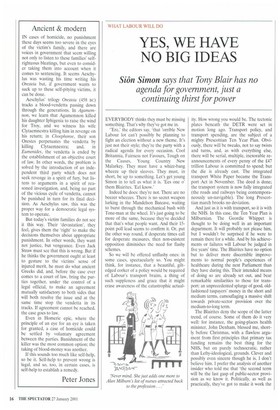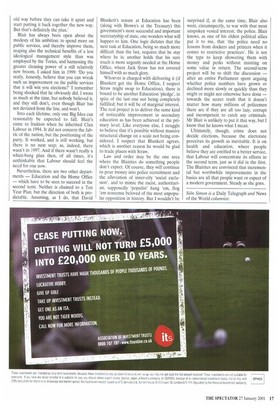YES, WE HAVE NO BIG IDEAS
SiOn Simon says that Tony Blair has no
agenda for government, just a continuing thirst for power
EVERYBODY thinks they must be missing something. That's why they've got me in.
"Ere,' the editors say, 'that 'orrible New Labour lot can't possibly be planning to fight an election without a new theme. It's just not their style; they're the party with a radical agenda for every occasion. Cool Britannia, Fairness not Favours, Tough on the Causes, Young Country New Malarkey. They must have a whizz-bang wheeze up their sleeves. They must, in short, be up to something. Let's get young Simon in to tell us what it is. 'Ees one o' them Blairites. 'Eel know.'
Indeed he does: they're not. There are no beezer wheezes. There is no secret weapon lurking in the Mandelson Batcave, waiting to burst through the mechanical bush with Tone-man at the wheel. It's just going to be more of the same, because they've decided that that's what people want. And their 15point poll lead seems to confirm it. Or, put the other way round, if desperate times call for desperate measures, then non-existent opposition diminishes the need for flashy schemes.
So we will be offered unflashy ones: in some cases, spectacularly so. You might think, for instance, that a beautiful, giltedged corker of a policy would be required of Labour's transport brains, a thing of such suppleness and grace that it might erase awareness of the catastrophic actual ity. How wrong you would be. The tectonic plates beneath the DETR were set in motion long ago. Transport policy, and transport spending, are the subject of a mighty Prescottian Ten Year Plan. Obviously, there will be tweaks, not to say twists and turns, and, as with everything else, there will be serial, multiple, inexorable reannouncements of every penny of the £47 trillion Labour is committed to spend; but the die is already cast. The integrated transport White Paper became the Transport Act in November. The deed is done; the transport system is now fully integrated (the roads and railways being contemporaneously un-navigable). The long Prescottian march brooks no deviation.
And just as it is with transport, so it is with the NHS. In this case, the Ten Year Plan is Milbumian. The Geordie Whippet is thought to be doing well in an important department. It will probably not please him, but I wouldn't be surprised if he were to remain there for a while. And by his achievements or failures will Labour be judged in five years' time. The Blairites have no option but to deliver more discernible improvements to normal people's experiences of healthcare during the next Parliament than they have during this. Their intended means of doing so are already set out, and bear remarkable similarities to those for transport: an unprecedented splurge of good, oldfashioned taxpayers' money in the short and medium terms, camouflaging a massive shift towards private-sector provision over the medium-to-long term.
The Blairites deny the scope of the latter trend, of course. Some of them do it very well: for instance, the going-places health minister, John Denham, blessed me, shortly before Christmas, with a flawless argument from first principles that primary tax funding remains the best thing for the NHS, but on purely technocratic, rather than Lefty-ideological, grounds. Clever and possibly even sincere though he is, I don't believe him. I prefer the analysis of another insider who told me that 'the second term will be the last gasp of public-sector provision as we know it. Politically, as well as practically, they've got to make it work the old way before they can take it apart and start putting it back together the new way. But that's definitely the plan.'
Blair has always been open about the modesty of his ambition: to spend more on public services, and thereby improve them, reaping also the technical benefits of a less ideological management style than was employed by the Tories, and harnessing the greater cleaning power of a still relatively new broom. I asked him in 1999: 'Do you really, honestly, believe that you can wreak such an improvement on the public services that it will win you elections?' I remember being shocked that he obviously did. I wrote as much at the time, but nobody believed it, and they still don't, even though Blair has not deviated from the line, and won't.
Into each lifetime, only one Big Idea can reasonably be expected to fall. Blair's came to fruition when he inherited Clan Labour in 1994. It did not concern the fabric of the nation, but the positioning of the party. It worked, and is still working, but there is no next step; as, indeed, there wasn't in 1997. And if there wasn't really a whizz-bang plan then, of all times, it's unthinkable that Labour should feel the need for one now.
Nevertheless, there are two other departments — Education and the Home Office — which have to be seen to succeed in the second term. Neither is chained to a Ten Year Plan, but the direction of both is predictable. Assuming, as I do, that David Blunkett's tenure at Education has been (along with Brown's at the Treasury) this government's most successful and important secretaryship of state, one wonders what will happen to him. One logic dictates that the next task at Education, being so much more difficult than the last, requires that he stay where he is; another holds that his sure touch is more urgently needed at the Home Office, where Jack Straw has not covered himself with so much glory.
Whoever is charged with delivering it (if Blunkett got the Home Office, I suspect Straw might swap to Education), there is bound to be another Education 'pledge', in spite of the last one not being completely fulfilled: but it will be of marginal interest. The real project is to deliver the same kind of noticeable improvement in secondary education as has been achieved at the primary level. Like everyone else, I struggle to believe that it's possible without massive structural change on a scale not being considered. I suspect that Blunkett agrees, which is another reason he would be glad to trade places with Straw.
Law and order may be the one area where the Blairites do something people don't expect. Of course, they will continue to pour money into police recruitment and the alleviation of inner-city 'social exclusion', and to mimic the racist, authoritarian, supposedly 'populist' hang 'em, flog 'em nonsense beloved of the most unpopular opposition in history. But I wouldn't be surprised if, at the same time, Blair also went, circumspectly, to war with that most unspoken vested interest, the police. Blair knows, as one of his oldest political allies put it to me, that 'the police need no lessons from dockers and printers when it comes to restrictive practices'. He is not the type to keep showering them with money and perks without insisting on some value in return. The second-term project will be to shift the discussion — after an entire Parliament spent arguing whether police numbers have grown or declined more slowly or quickly than they might or might not otherwise have done — towards the secret truth that it doesn't matter how many millions of policemen there are if they are all too lazy, corrupt and incompetent to catch any criminals. Mr Blair is unlikely to put it that way, but I know that he knows what I mean.
Ultimately, though, crime does not decide elections, because the electorate perceives its growth as inevitable. It is on health and education, where people believe they are entitled to a better service, that Labour will concentrate its efforts in the second term, just as it did in the first. The Blairites are convinced that incremental but worthwhile improvements in the basics are all that people want or expect of a modern government. Steady as she goes.
SiOn Simon is a Daily Telegraph and News of the World columnist.























































































 Previous page
Previous page